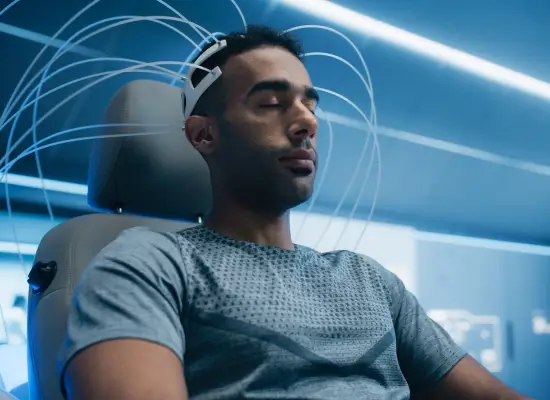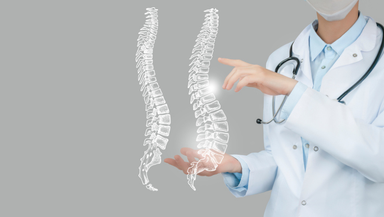DBS is adjustable and reversible. However, it does not cure the underlying health condition. It can help manage the symptoms and improve quality of life, but it does not cure the condition.

- Synopsis
- Introduction
- What is Deep Brain Stimulation?
- How Deep Brain Stimulation Works?
- Medical Applications of DBS
- Benefits of Deep Brain Stimulation
- Risks and Challenges Involved in Deep Brain Stimulation
- Recovery and Aftercare
- Why Choose Gleneagles Hospital for DBS Surgery in Bangalore?
- Conclusion
Synopsis
Deep Brain Stimulation is a highly beneficial and advanced procedure for treating neurological conditions. Parkinson’s disease, epilepsy, dystonia, and essential tumours are some of the neurological disorders that can be managed with DBS surgery. Read on to get the full details of the procedure.
Introduction
The human brain is a complex network of neurons that regulates all aspects of our body and behaviour. Neurological illnesses that disturb brain function can have a significant influence on a person's quality of life. While drugs and traditional therapies can bring comfort, they are not always successful. This is when Deep Brain Stimulation (DBS) comes into play. DBS is a cutting-edge therapeutic approach that offers fresh hope to people suffering from mobility and psychological problems.
We will delve into the science of DBS, including its mechanism, medicinal uses, advantages, dangers, and post-operative care. We will also discuss why Gleneagles Hospital is a trusted name for DBS stimulation in Bangalore.
What is Deep Brain Stimulation?
Deep Brain Stimulation or DBS surgery is a surgical procedure in which neurotransmitters and electrodes are implanted that sends electrical impulses to the brain. These electrical impulses help restore movement imbalances caused by various neurological problems like Parkinson’s disease. When a DBS surgery is successful, it causes an interruption in the irregular signals that result in tremors or abnormal body movements.
How Deep Brain Stimulation Works?
Firstly, your neurosurgeon will perform a series of tests to identify your neurological condition and the exact location where it all starts. Before moving on to the procedure of Deep Brain Stimulation surgery, there are three main components involved in the procedure that one should be well-versed in.
- Electrodes - Also known as leads, they are implanted in the targeted area of the brain that is to be treated.
- Neurostimulator - A battery-powered device called a Neurostimulator is placed beneath the skin of either the chest or the abdomen, depending on the requirements.
- Extension Wires - Extra wires, referred to as Extension wires, are used to connect the electrodes to the neurostimulator.
The procedure involves various steps.
- Surgical Implantation Electrodes are surgically placed into specific brain regions. The areas where electrodes are generally implanted include the subthalamic nucleus and globus pallidus.
- Programming and Adjustments After surgery to place the electrodes, the neurostimulator is programmed to deliver electrical impulses that modulate and control any abnormal neural activities.
- Continuous Monitoring Patients then undergo regular assessments to optimise the stimulation settings and ensure the smooth working of the stimulator and the leads.
Your health matters – get expert advice today.
Medical Applications of DBS
DBS surgery is treatment for several neurological and psychiatric conditions and is FDA-approved. Some of the medical applications of Deep Brain Stimulation surgery include the following.
- Parkinson’s Disease DBS is highly effective at managing the motor symptoms of Parkinson’s disease. Deep Brain Stimulation surgery can improve tremors, rigidity, and bradykinesia. Patients seeking to reduce their dependence on medication and enhance overall mobility can derive significant benefits from DBS surgery.
- Essential Tremor Patients experiencing severe tremors have significant improvement in hand movement steadiness and overall coordination after DBS surgery.
- Dystonia Some symptoms of Dystonia, such as involuntary muscle contractions and painful & abnormal postures, can be cured with the help of a DBS surgery.
- Epilepsy DBS proves to be an effective solution for reducing the frequency and severity of seizures, which generally can’t be controlled with regular anti-seizure medications.
- Obsessive-Compulsive Disorder (OCD) When therapy options do not work for an OCD patient with severe illness, doctors usually advise getting a DBS surgery done. It helps in regulating compulsive behaviours in the patients.
- Depression and Other Psychiatric Disorders DBS has shown significant results in relieving symptoms of treatment-resistant psychiatric conditions such as depression and Tourette syndrome.
Benefits of Deep Brain Stimulation
DBS offers numerous advantages over conventional treatment methods. Some of the key benefits of Deep Brain Stimulation are mentioned below.
- Significant Symptom Relief: Patients with troublesome neurological conditions can get relief from symptoms such as tremors, rigidity, dystonia, and other psychiatric symptoms.
- Medication Reduction: The procedure is a more effective solution as the stimulator is surgically placed inside the body. This allows the patients to reduce dependency on medications and minimise the side effects caused by them.
- Reversible and Adjustable: A DBS surgery is reversible. This means that once fixed, the electrodes and stimulator can still be adjusted or modified.
- Improved Quality of Life: By managing symptoms, DBS helps to enhance an individual’s daily functioning, mobility, and independence.
- Minimal Brain Damage: No permanent damage is caused to the brain tissues during the surgery. This makes DBS a safer option.

Risks and Challenges Involved in Deep Brain Stimulation
Deep Brain Stimulation is a safer alternative to brain surgery, which has a lot of risks. However, the patient might experience some challenges in a DBS surgery, which are generally temporary and can be resolved. Some of them include:
- Surgical Risks - If not performed by an expert neurosurgeon, DBS can cause bleeding, infections, or other hardware complications that require further treatment.
- Side Effects - However rare, DBS can cause some side effects like speech difficulties, balance issues, or mood changes.
- Battery Replacement - Neurostimulator batteries have a limited lifespan and require periodic replacement for efficacious functioning.
- Cost Factor - DBS can be expensive. Since it is an advanced procedure and only highly experienced doctors can perform it, the prices are generally higher. However, many hospitals like Gleneagles Hospital offer more affordable options with other financing alternatives.
Recovery and Aftercare
The recovery process of a DBS surgery involves multiple stages. Each stage has its importance.
- Hospital Stay - The patients are required to remain hospitalised for a few days post-surgery for monitoring purposes.
- Healing Period - The site being operated on would take a few weeks or a month to heal completely.
- Neurostimulator Activation - A few weeks after your surgery, your doctors will activate the stimulator and fine-tune its settings.
- Rehabilitation and Follow-up - Regular consultations with your surgeons are crucial. Monitoring the progress of your condition and ensuring the proper functioning of the device is necessary.
After undergoing a DBS surgery, the patients are advised to:
- Avoid any strenuous activities for at least a few weeks after your surgery. Anything that puts pressure on the operated area should be avoided.
- Take all the prescribed medications that your neurosurgeon has recommended to prevent infections or inflammation.
- Follow a customised rehabilitation plan. Every individual is different, and so is their recovery. Including physiotherapy is generally suggested for improving mobility and regaining strength.
Why Choose Gleneagles Hospital for DBS Surgery in Bangalore?
Gleneagles Hospital, the leading hospital for BDS surgery in Bangalore, is a preferred choice of many, especially known for its excellence in neurology and neurosurgery. The hospital stands out as the best hospital and the most reputed name, with a proven track record of consistently providing successful DBS surgery with cutting-edge treatment facilities for other neurological conditions.
Some of the reasons that make Gleneagles Hospital stand out in the crowd and become the leading centre for DBS surgery in Bangalore include:
- A team of highly experienced neurosurgeons and neurologists specialising in providing seamless DBS surgery.
- State-of-the-art medical facilities with the most advanced surgical infrastructure and treatment instruments.
- Comprehensive Pre- and Post-Operative Care with personalised rehabilitation programs for a smoother and faster recovery.
- Affordability and financial assistance are the two main grounds of our operational therapy. Gleneagles Hospital provides flexible payment options for our patients.
- Our doctors follow a patient-centric approach and strive to provide holistic care to ensure the best possible outcomes for each of our patients
Conclusion
Deep Brain Stimulation has revolutionised the management and treatment of neurological and psychiatric disorders. It not only offers patients a renewed sense of hope for relieving their symptoms but provides a more long-term solution for their problem. While the procedure might involve certain risks, the benefits it provides to the patients outweigh them, making it a viable option. Gleneagles Hospital in Bangalore has provided world-class DBS treatment over the years and is continuing to do so. The neurosurgeons at Gleneagles Hospital ensure expert care and long-term patient support for every individual who consults us.
If you are looking for a credible option for your DBS surgery in Bangalore, then Gleneagles is undoubtedly the best hospital you can visit. Consult with our doctors today and get a personalised treatment tailored to your problems.
Our Doctors
View allDr Naveen M A
HOD & Sr Consultant - Minimal Access Brain and Spine Surgery
MBBS, MS, MCh (Neuro), FMAS, FMISS (Seoul), FASS (USA), Fellow Skull base Endoscopy (USA)
Frequently Asked Questions
The cost of a DBS surgery in Bangalore would vary based on hospital facilities, surgeon expertise, and post-surgical care. Patients are advised to consult hospitals for an accurate estimate of the overall procedure cost.
Patients with movement disorders or psychiatric conditions that are not responding to medication are the ideal candidates for a DBS surgery. However, an in-depth evaluation by a neurologist is necessary.
Many insurance providers offer partial or full coverage for DBS procedures. It is, however, best to check with the hospital’s finance department for a detailed overview.
The time that an individual would take to recover from a DBS surgery depends on the condition to be treated. Typically, initial recovery takes around a few weeks time but the patients might take some more time to get used to the stimulator and optimise the setting according to their needs.
















